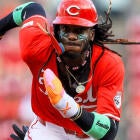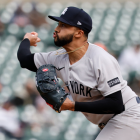Major League Baseball will increase salaries for minor-league players beginning with the 2021 season. The minimum salary at every minor-league level will improve by at least 38 percent, per the Associated Press.
That means rookie and short-season players will make $400 a week instead of $290; Class-A will make $500 instead of $290; Double-A will make $600 instead of $350; and Triple-A will make $700 instead of $502. Triple-A players, then, will make at least $14,000 a season. Every other level will make $12,000 or less for the season.
The San Francisco Giants, for their part, will implement the raises this season. The Cubs and Blue Jays have also given their minor leaguers raises in the last year.
The raises are a step in the right direction, but minor-league players remain exploited and mistreated by MLB. Let's explain how by hitting on some important issues.
Why pay remains a problem
As noted above, the increased salaries will still leave most minor-league players below the poverty line. That's because the players are paid for only the regular season, which stretches about five months, from April until the end of August. Players are not paid for spring training or for any instructional work they partake in after the season. They're also not paid during the winter.
Here's a recent example of how the pay structure works from Rafa Nieves, a prominent agent and the vice president of baseball at Wasserman Media Group who represents a number of international-born players, such as Jose Ramirez, Victor Robles, and Luis Castillo:
One of my clients got invited to big league camp. He received 3 weeks of meal money when he reported ($3,900 cash). That’s more than the money he will earn after taxes during the entire year in the minors.
— Rafa Nieves (@mlb_agent) February 16, 2020
Playing professional baseball is a year-round occupation, yet MLB and the minor leagues pretend otherwise in order to save money. Congress passed the Save America's Pastime Act in 2018, ruling that minor-league players were ineligible to receive overtime pay despite working more than 40 hours per week when training, traveling, and all other activities are counted.
MLB's re-affiliation plan
Earlier in the winter, MLB proposed revoking affiliation status from more than a quarter of the 160 minor-league teams as part of its negotiations with the minor leagues on a new Professional Baseball Agreement. The plan was originally hatched by Houston Astros general manager Jeff Luhnow, who has since been suspended and removed from his position.
Commissioner Rob Manfred has since said MLB's plan prioritizes the wellbeing of the players, with the emphasis being on improving pay and facilities. Essentially, MLB doesn't want to be responsible for paying higher salaries or for upkeeping stadiums, clubhouses, and so on for 160 MiLB teams. MLB made more than $10 billion in revenues last season.
In a sense, players are being positioned against one another: A lot of jobs would be eliminated if the minors were reduced, yet those that remained would be compensated better.
MiLB players in video games
Minor-league players even receive the short end of the stick when it comes to video games.
Although Sony's MLB The Show franchise has only ever included members of the players' union, gamers could always download user-created rosters containing real-world prospects. That will change this year, as MLB The Show will ship with real-life minor-league rosters for the first time, a development that is being used in marketing.
Despite their involvement clearly holding value to Sony, the featured players will not receive compensation due to the likeness clause in their contracts.
MiLB's players contracts sign over to MLB the right to their likeness for a wide variety of uses. Or more accurately "in any medium whatsoever for any purpose." https://t.co/qL11tvZN9I pic.twitter.com/f8ROUZTKy2
— JJ Cooper (@jjcoop36) February 18, 2020
If MLB is serious about improving life for minor-league players, and has legitimate reservations about footing the bill themselves, then requiring Sony to pay something for those players likenesses -- and then handing that money over to the players themselves -- would seem like a reasonable path to take. That's not the path the league chose in 2020, however.
Other amenities
Remember, part of MLB's issues with more than a quarter of its minor-league affiliates entail the quality of their facilities. It's curious, then, that some MLB teams who own their affiliates would choose against allowing their minor-league players to use their stadium's amenities.
For example, consider this recent tweet about the New York Mets' spring training stadium in Port St. Lucie, which recently underwent a $57 million upgrade:
The most striking part of the Mets' $57 million spring training renovation may be the home clubhouse. The Mets are only using it for Spring Training, not for the St. Lucie regular season, to give minor leaguers a reminder of the status they're working to earn. pic.twitter.com/k1b3vTTkj3
— Anthony DiComo (@AnthonyDiComo) February 10, 2020
The Mets covered just $2 million of those upgrades, with the rest falling on local taxpayers. Yet the Mets are concerned that allowing their minor-league players to use the big-league clubhouse will encourage complacency. Instead, the fancy, publicly subsidized clubhouse will be used for roughly six weeks out of every year -- and the players are the entitled ones.
An old, but changing topic
Unfortunately, the mistreatment of minor-league players is nothing new. Neither are the scare tactics used by league officials to excuse poor pay.
Back in 1994, the Vice President of the National Association of Professional Baseball Leagues said in response to increasing pay that "a lot of communities that have minor-league teams would lose them." A quarter of a century later, that same excuse remains in circulation.
There has been some progress made, and not only in the form of these raises.
Pitcher-turned-attorney Garrett Broshuis secured a win in January when a federal appeals court rejected MLB's request that a 2014 lawsuit over minor-league wages wouldn't be heard in a class action capacity. This came after a ruling last August that players in Arizona, California, and Florida could participate. The players are seeking back pay for illegally low compensation.
Minor-league players still lack representation in the form of a union -- their peers in the NBA G League are taking steps to create one -- but the rise of social media has allowed them a louder voice than in the past. The more the players illuminate their poor living conditions and salaries, the more pressure will be placed on MLB to do the right thing and pay minor-league talent livable wages.
![[object Object] Logo](https://sportshub.cbsistatic.com/i/2020/04/22/e9ceb731-8b3f-4c60-98fe-090ab66a2997/screen-shot-2020-04-22-at-11-04-56-am.png)


















